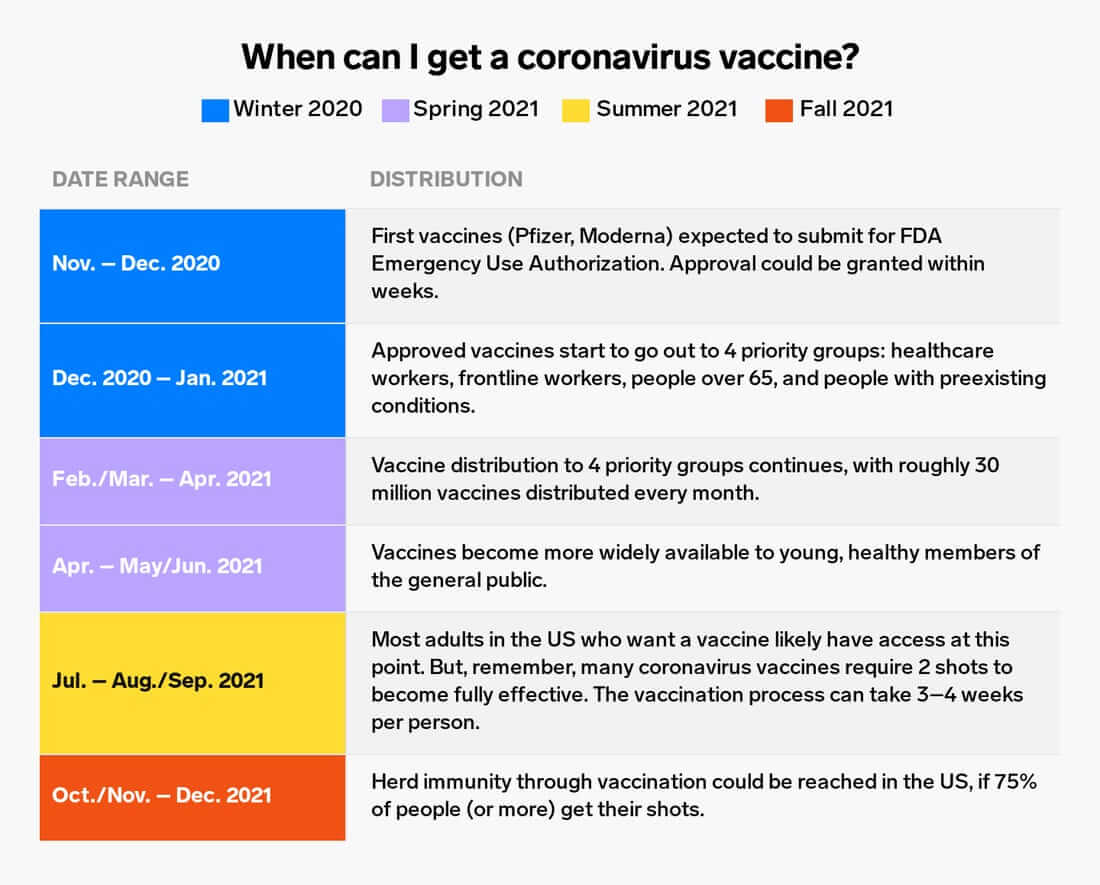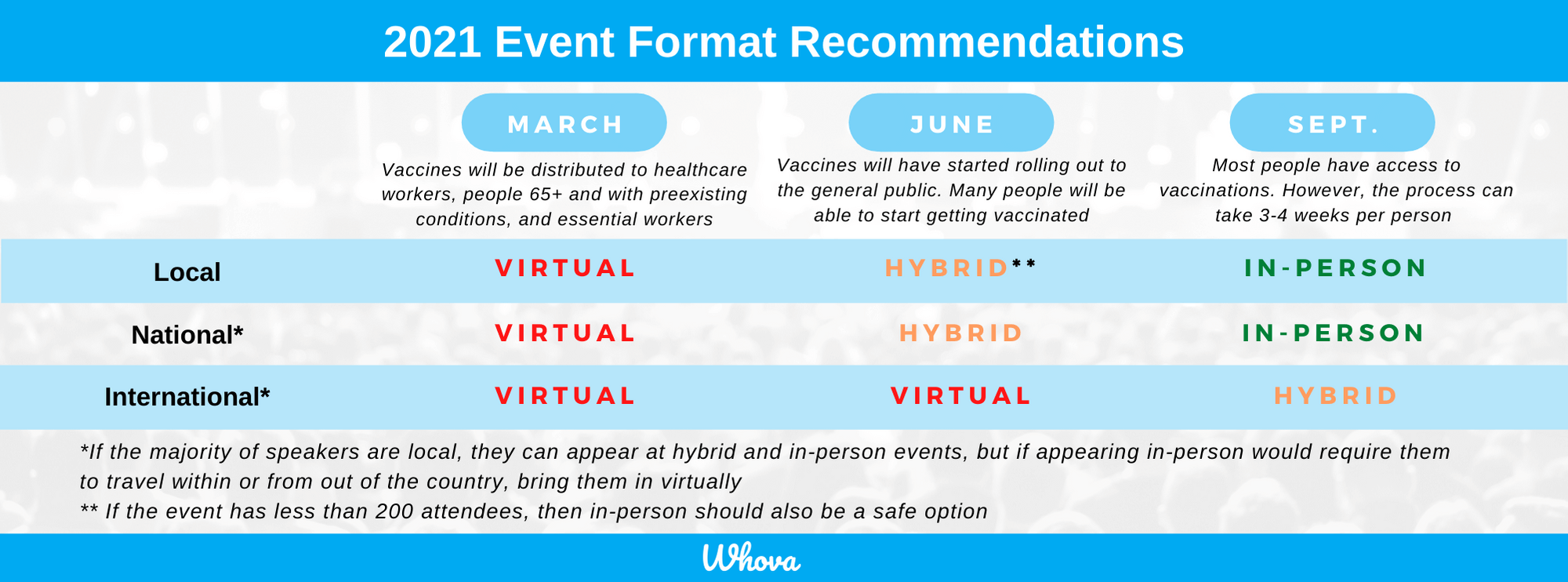After a difficult year, news of a possible vaccine has gotten many people excited to return to normal. However, the shift back to in-person events will be gradual, and there are still plenty of questions left to be answered. If you’re planning an event for spring or summer of 2021, you’re probably unsure what form that event will take: virtual, in-person, or a combination of the two?
We’ve researched what top experts are saying about the vaccine, thoughts from the travel industry on international travel, event organizers’ experiences with hybrid events, and more to help predict what 2021 will bring to the events world. Of course, no one has definitive answers, but as you plan for spring and summer events, here are some of the key takeaways you should be aware of.
Expect some in-person elements as vaccines start being distributed in the spring
While the immunization process will be gradual, we’ll probably start seeing real results around March and April. Business Insider estimates that by March, healthcare workers, frontline workers, people over 65, and people with pre-existing conditions will widely have been vaccinated. Secretary of Health and Human Services, Alex Azar, says that vaccines should become more widely available later in the spring, with “enough for all Americans by the end of March to early April to have general vaccination programs.”

Source: businessinsider.com/when-can-i-get-a-coronavirus-vaccine-timeline-2020-11
If all goes according to plan, you should be able to introduce some in-person elements to local events with the right precautions. Remember, this doesn’t mean just carrying out in-person events as usual! You’ll want to ensure that everyone has tested negative and still keep the number of in-person attendees to a minimum.
 By this estimation, widespread impact likely won’t come until the summer or even the fall. However, as vaccines become more available to the public over the summer, these in-person elements of hybrid events will be more widespread and easier to hold. At this point, it will start to be significantly safer for attendees to travel from around the country to attend the conference. Even then, events will likely not look like they did, but with the right planning, in-person elements of events will probably be possible to hold safely.
By this estimation, widespread impact likely won’t come until the summer or even the fall. However, as vaccines become more available to the public over the summer, these in-person elements of hybrid events will be more widespread and easier to hold. At this point, it will start to be significantly safer for attendees to travel from around the country to attend the conference. Even then, events will likely not look like they did, but with the right planning, in-person elements of events will probably be possible to hold safely.

You can simplify hybrid events by spacing out virtual and in-person elements
Even when more and more of the population starts getting vaccinated over the summer, events are still likely to be hybrid, rather than fully in-person. As desperate as we all are to start getting back to normal, keep in mind that:
- Not all areas of the country will have access to vaccines right away.
- Traveling is still inconvenient! Several airlines have closed due to the pandemic, making obtaining affordable flights more difficult, and many people are still hesitant to fly.
- International participants may face travel restrictions and trouble getting vaccinated.
As such, while you’ll be able to start bringing small groups of attendees, the majority of the event will probably need to take place online unless the event is local and under 200 attendees.
However, remember that hybrid events can be draining! Between planning engagement, networking, and session opportunities for both the in-person and online components, many organizers find hybrid events particularly exhausting.
If you’re set on the in-person element, we recommend saving yourself some stress by cutting the event into two blocks — first, hold a small limited in-person event, and then upload the recorded content to a virtual platform with new opportunities for Q&A, engagement, and networking for virtual attendees.
Book venues early and away from crowds
If your event does have an in-person component, choosing the right venue is vital. While bustling parts of the city can make for fun destinations pre-COVID, the further away from the crowd, the better it is for hybrid events. Dr. Anthony Fauci roughly estimates that events that will draw crowds likely won’t be safe until around 2022, so try to find a quiet location for the dual benefits of keeping people safe and getting them away from the exhausting work-from-home environment.  But remember: while it’s tempting to hesitate when solidifying plans right now, be sure to secure your venue early. While the standard rule of thumb is to book your venue book 4-6 months ahead of time, as more events look to book bigger blocks of hotels for fewer people, it can get even more tricky, so the earlier, the better. To make sure you’re able to secure your venue, try booking 2 months earlier than you usually would.
But remember: while it’s tempting to hesitate when solidifying plans right now, be sure to secure your venue early. While the standard rule of thumb is to book your venue book 4-6 months ahead of time, as more events look to book bigger blocks of hotels for fewer people, it can get even more tricky, so the earlier, the better. To make sure you’re able to secure your venue, try booking 2 months earlier than you usually would.
International attendees will need a vaccination certificate
Later in the year, as people become more comfortable traveling, you may start to consider international attendees. While different countries will be getting the vaccine at different times, you should be safe as long as you can ensure that all international attendees have been vaccinated. To verify this across countries, ask attendees to upload a vaccination certificate or immunity passport as they purchase tickets.
Despite these measures, be prepared for the possibility that international attendees won’t be able to make it, as international travel regulations change! Definitely don’t depend on any international speakers flying in for the event, and make it easy for speakers and attendees to switch to a virtual option if need be.
Most speakers will be online, even after in-person elements start to return
Getting to see a speaker in-person and possibly meet them face-to-face is exciting, but many speakers, especially high-profile ones, may understandably want to stay online to keep their appearance safe and convenient.
Get the best of both worlds by trying to find a balance between in-person and online speakers. Even if the majority of your event is held in-person, international speakers, or even speakers that need to travel long distances across the country, will likely need to speak virtually. If possible, book high-profile speakers who can address attendees remotely, and invite more local speakers to interact with in-person attendees face-to-face.
You can keep your event safe and successful
Although we can’t know exactly what lies ahead, things are gradually returning to something closer to normal. Remember, no matter what next year looks like, with experience with in-person and virtual events under your belt, 2020 has prepared for you whatever 2021 might look like.
Still, thinking ahead is an important step in providing a safe, healthy event and making informed decisions for the new year. If you’re interested in learning more about events in all formats and what we can do to help yours succeed, just reach out today for more information and a free demo of the Whova platform.
Related Case Studies

